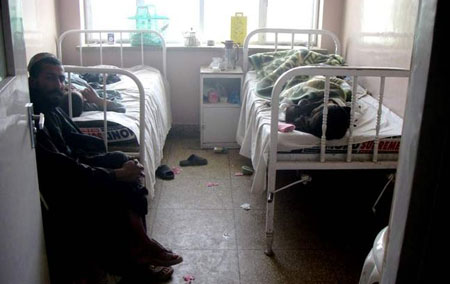KANDAHAR, Afghanistan - Tiny patients go two to a bed and overworked doctors are on the verge of burnout in the children's ward of southern Afghanistan's largest hospital.

An intensive-care unit at Mirwais Hospital in Kandahar, seen in 2007. (Photo: Tom Blackwell / National Post)
A steady flow of sick kids is pushing Kandahar city's already overstretched Mirwais hospital beyond the brink. But pleas for badly needed doctors, equipment and beds seem to be falling on deaf ears.
"Whenever we see our superiors, like (the) minister, like those people from Kabul, this is our cry that our staff is very little," said Dr. Muhammad Sidiq, the head of the children's ward.
"So we just can complain. But we have to work because the patient is in front of us."
Many of those young patients arrive at Mirwais suffering from ailments that ought to be treatable, such as dehydration, malnutrition and infections.
But by the time they're admitted, many of the children are beyond a cure.
Sidiq explains that many parents, particularly those from rural areas, are poor and uneducated. Their children are born into dirty homes. When they get sick, it can be days or weeks before they're taken for medical care.
That's partly because the violent conflict between NATO forces and Taliban fighters makes the roads too dangerous to travel.
But the harsh Afghan weather can also make the long journey treacherous. Other times, parents can't afford the trip. And sometimes they just don't know any better.
Many turn to snake oil peddled by local shysters purporting to be healers. And when that fails to cure the children, as it inevitably does, the parents have no choice but to beg and borrow enough money for the trip into town.
Sidiq wearily recounts this sad and too-familiar tale over lukewarm tea after a recent tour of the hospital.
Papers clutter the desk in his cramped office. Among the documents are the ward's November statistics. Sidiq says more than half his 110 patients died last month. Just 53 were cured.
The hospital is dirty. Flies crawl across children's faces. An Afghan doctor disturbs a swarm of flies when he lifts a pile of blankets off a bed, uncovering two children. This is common. The ward is meant for up to 80 patients, but the number of children here at any given time usually exceeds that.
"Thank God, our patients are tiny, so we can fit two in one bed sometimes," Sidiq said.
The doctors work around the clock all week, trying to keep on top of their case loads. There are only eight resident doctors and five pediatricians, counting Sidiq. He says there should be at least double that. Asked why he doesn't hire more doctors, Sidiq says he doesn't have the budget for it.
He says most equipment comes from aid groups, such as the International Committee of the Red Cross.
Canada, through the Canadian International Development Agency, has committed $10.2 million to a three-year UNICEF project in Kandahar province.
The money will help provide health services to thousands of young children and pregnant women in Kandahar and the wider southern region. It will also help Mirwais hospital and a maternal waiting home in Kandahar buy equipment and supplies.
Sidiq had a typically Afghan response when asked how he manages to keep his ward running with such limited resources.
"We are Afghan and we are from Kandahar. So we have to manage it," he said. "Because we don't have any other option."



